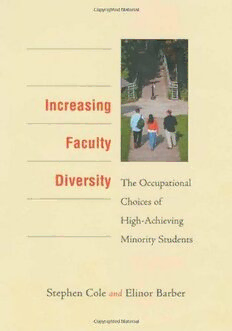Download Increasing Faculty Diversity: The Occupational Choices of High-Achieving Minority Students PDF Free - Full Version
Download Increasing Faculty Diversity: The Occupational Choices of High-Achieving Minority Students by Stephen Cole, Elinor Barber in PDF format completely FREE. No registration required, no payment needed. Get instant access to this valuable resource on PDFdrive.to!
About Increasing Faculty Diversity: The Occupational Choices of High-Achieving Minority Students
In recent years, colleges have successfully increased the racial diversity of their student bodies. They have been less successful, however, in diversifying their faculties. This book identifies the ways in which minority students make occupational choices, what their attitudes are toward a career in academia, and why so few become college professors. Working with a large sample of high-achieving minority students from a variety of institutions, the authors conclude that minority students are no less likely than white students to aspire to academic careers. But because minorities are less likely to go to college and less likely to earn high grades within college, few end up going to graduate school. The shortage of minority academics is not a result of the failure of educational institutions to hire them; but of the very small pool of minority Ph.D. candidates. In examining why some minorities decide to become academics, the authors conclude that same-race role models are no more effective than white role models and that affirmative action contributes to the problem by steering minority students to schools where they perform relatively poorly. They end with policy recommendations on how more minority students might be attracted to an academic career.
Detailed Information
| Author: | Stephen Cole, Elinor Barber |
|---|---|
| Publication Year: | 2003 |
| ISBN: | 9780674009455 |
| Pages: | 385 |
| Language: | English |
| File Size: | 0.974 |
| Format: | |
| Price: | FREE |
Safe & Secure Download - No registration required
Why Choose PDFdrive for Your Free Increasing Faculty Diversity: The Occupational Choices of High-Achieving Minority Students Download?
- 100% Free: No hidden fees or subscriptions required for one book every day.
- No Registration: Immediate access is available without creating accounts for one book every day.
- Safe and Secure: Clean downloads without malware or viruses
- Multiple Formats: PDF, MOBI, Mpub,... optimized for all devices
- Educational Resource: Supporting knowledge sharing and learning
Frequently Asked Questions
Is it really free to download Increasing Faculty Diversity: The Occupational Choices of High-Achieving Minority Students PDF?
Yes, on https://PDFdrive.to you can download Increasing Faculty Diversity: The Occupational Choices of High-Achieving Minority Students by Stephen Cole, Elinor Barber completely free. We don't require any payment, subscription, or registration to access this PDF file. For 3 books every day.
How can I read Increasing Faculty Diversity: The Occupational Choices of High-Achieving Minority Students on my mobile device?
After downloading Increasing Faculty Diversity: The Occupational Choices of High-Achieving Minority Students PDF, you can open it with any PDF reader app on your phone or tablet. We recommend using Adobe Acrobat Reader, Apple Books, or Google Play Books for the best reading experience.
Is this the full version of Increasing Faculty Diversity: The Occupational Choices of High-Achieving Minority Students?
Yes, this is the complete PDF version of Increasing Faculty Diversity: The Occupational Choices of High-Achieving Minority Students by Stephen Cole, Elinor Barber. You will be able to read the entire content as in the printed version without missing any pages.
Is it legal to download Increasing Faculty Diversity: The Occupational Choices of High-Achieving Minority Students PDF for free?
https://PDFdrive.to provides links to free educational resources available online. We do not store any files on our servers. Please be aware of copyright laws in your country before downloading.
The materials shared are intended for research, educational, and personal use in accordance with fair use principles.

